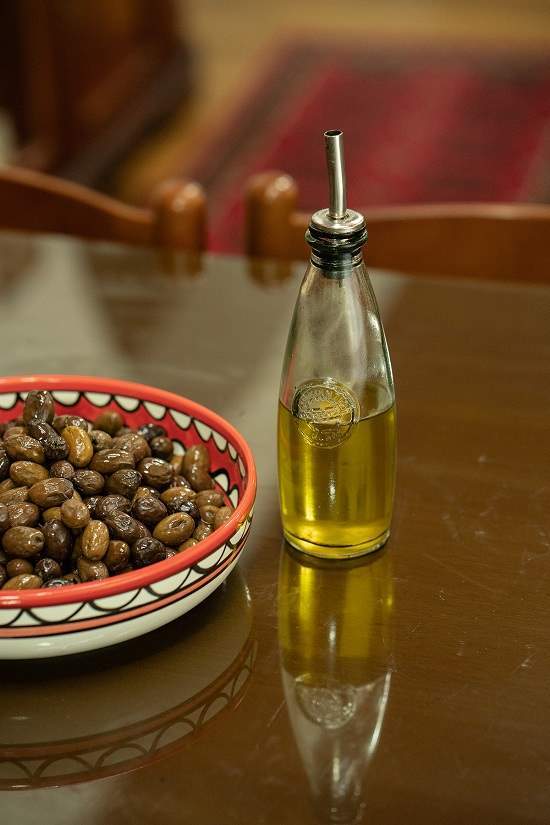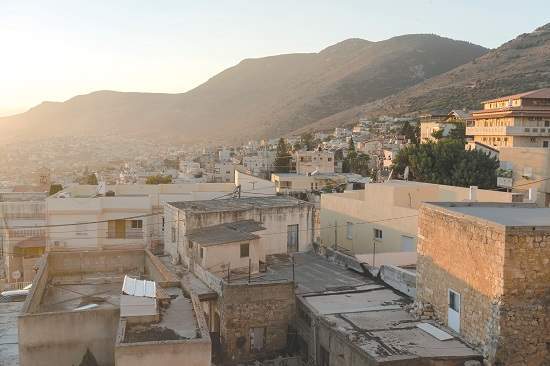RAMEH, Palestinian Territories — A pot of mujadara was packed and ready to go, a small jar of olives and some bread alongside it. It was the dead of winter in this Palestinian mountain village in the Tiberius, and Abla Hussein, who is now 86, was a child at the time, no more than 7 or 8 years old. She and her family were ready to make the hour-long walk to their olive groves, where they would spend the entire day, every day, during the nearly three-month length of the harvest season.
اضافة اعلان
The olives that grew there were plump with oil, she said: “There was so much oil inside, and the oil was so sweet as it slid down your throat.”
Rameh’s olive oil has long had a reputation for being the best in the country, even the broader region, and it is central to the identity of the village. Fresh out of the press, it is bright liquid gold, its aroma reminiscent of the wild grasses and dandelion leaves that grow around the olive trees. People describe it as ripe and smooth, almost like samneh (ghee, or clarified butter).
While southern Spain and southeastern Italy are now the biggest commercial olive-oil-producing regions in the world, evidence suggests that the land surrounding the Lake Tiberius — where Rameh sits on the slopes of Mount Haidar — was once the world’s most important olive region. Recent research indicates it was the site of the earliest olive cultivation, too, dating back to 5,000 BC.
 A bowl of black olives and olive oil from Musa Khalaf’s grove in Rameh, a Palestinian town surrounded by olive groves.
A bowl of black olives and olive oil from Musa Khalaf’s grove in Rameh, a Palestinian town surrounded by olive groves.
Today, centuries-old olive trees surround Rameh in every direction — a green sea, the rustle of leaves akin to waves. In newspaper articles, books, and even poems, the olives are described as “the best you ever laid eyes on” and the village itself as “the queen of Palestinian oil.”
Yousef Hanna, the chef and owner of the acclaimed restaurant Magdalena, in Tiberias, stores the new-harvest oil in glass bottles in the freezer so he can offer its freshly pressed flavor to diners year-round. Hanna, 47, who is from Rameh, said he has tried olive oils from all over the world. While some, like a recent bottle from Mount Etna in Sicily, come close in flavor, he still favors the jerrycans he gets locally in season.
“Look, everybody thinks their oil is the best,” he said, “but the olive oil from Rameh is smooth and doesn’t burn. It’s like a ripe fruit: pungent but sweet.”
As Mazen Ali put it, referencing an Arabic proverb, “A monkey, in its mother’s eyes, is a gazelle.” Ali, 60, is the cofounder of a nonprofit group dedicated to preserving the region’s olive trees. Although he is from the neighboring village of Deir Hanna, even he acknowledged that Rameh’s oil is exceptional.
So what makes this oil so good, even superior? Explanations abound.
There are many factors, Ali said, like the olive fruit fly, a pest that attacks olive trees from the coast inward. The fly forces other villages to harvest their olives earlier, before the crop is damaged. But Rameh, because it is situated higher and farther inland, can wait longer and allow the olives to ripen on the tree. This makes for oil that has “a pleasant bitterness, but is still delicate and fruity,” he said.
 Rameh, which has been called “the queen of Palestinian oil,” October 4, 2021. Rameh has long had a reputation for producing especially good oil.
Rameh, which has been called “the queen of Palestinian oil,” October 4, 2021. Rameh has long had a reputation for producing especially good oil.
“But enough, I will get upset now,” he said, laughing. “Deir Hanna’s olive oil is also very good.”
Musa Khalaf, 82, a retired real estate assessor and one of the largest olive grove owners in Rameh, spoke of the quality of the Suri olives that grow there, an ancient variety that yields a lot of oil. There’s also the favorable climate, the nutrient-rich soil tilled by livestock and never treated with fertilizer, and the meticulous pruning and care throughout the year.
The olives are picked at peak ripeness, said Khalaf, “not green, not black, but shades and spots of green and purple-black.” They still harvest by hand in Rameh, using a pole to knock down ripe olives. The olives are pressed immediately after harvest, which makes for oil with a smoother taste.
Before 1948, Rameh’s olive groves could produce up to 250,000 liters in a high-yield year. The oil was sold widely across the country and in Lebanon and Syria as well. But production has dropped in the seven decades since.
Nasab Hussein, 34, a cultural researcher and author, and Hussein’s niece, documents this change in her book “Rameh: An Untold Story,” published in 2020. She explained how the expropriation of land from Palestinian farmers and the closure of borders with Syria and Lebanon, which led to a labor shortage, diminished the economic viability of olive farming. “You really can’t separate our olive story from the political one,” she said.
People used to work and go to school in Rameh, she said, and still relied on olive farming for income. But from 1948 until 1966, Israeli occupation forces restricted movement, preventing farmers from accessing their groves. Trees were neglected, yields became much lower, and prices dropped. Today, far fewer families rely on olive farming than in the past, and it no longer sustains the village economically. It’s difficult even to know how much oil Rameh produces now.
But the oil is still pressed, mostly for personal consumption, and it is still indispensable — a central part of life in the village, used as food and medicine. (“You rub it on the chest if you’re coughing,” Abla Hussein said. “You put a warm drop in your child’s ear if it hurts. I don’t understand, why would you even use medicine?”)
Khalaf and his wife, Safa, and their children continue to maintain their groves, and they have started exploring ways to sell their olives and oil abroad.
“We cook everything in it,” Safa Khalaf said. Stews and mujadaras are all made with their oil, as are their maakarona, malateet, and manaqeesh.
“But who really needs a dish?” Musa Khalaf said. “The best meal in the world is a piece of bread dipped in freshly pressed olive oil.”
Read more Good Food



